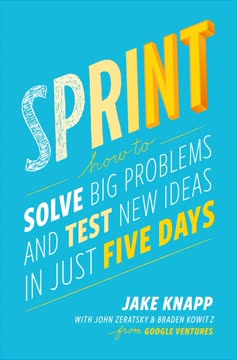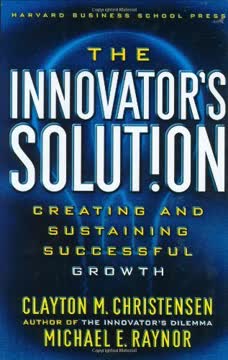Key Takeaways
1. The Modern Company: Embracing Continuous Innovation
A modern company is one in which every employee has the opportunity to be an entrepreneur.
Continuous innovation is crucial. In today's rapidly changing business landscape, companies must foster a culture of continuous innovation to remain competitive. This involves:
- Empowering every employee to think and act entrepreneurially
- Embracing experimentation and rapid iteration
- Balancing disciplined execution with entrepreneurial management
The modern company focuses on sustained impact through continuous innovation, rather than relying on steady growth through prescriptive management. It operates with cross-functional teams that work iteratively to serve customers, rather than siloed departments passing work in a linear fashion.
2. Entrepreneurship as a Core Function
Entrepreneurship fundamentally requires learning by doing.
Entrepreneurship is a missing function. Many organizations lack a dedicated function for fostering entrepreneurship and innovation. To address this, companies should:
- Create a dedicated entrepreneurship function within the organization
- Develop career paths for corporate entrepreneurs
- Integrate entrepreneurial thinking across all departments
This function should oversee high-potential growth initiatives, infuse an entrepreneurial mindset throughout the organization, and manage the integration of successful internal startups into the broader company structure.
3. The Startup Way: Principles for Transformation
Think big. Start small. Scale fast.
Five key principles guide transformation:
- Continuous innovation
- Startup as atomic unit of work
- The missing function of entrepreneurship
- The second founding
- Continuous transformation
These principles help organizations create cycles of continuous innovation, unlock new sources of growth, and develop the ability to rewrite their DNA in response to new challenges. The Startup Way combines the rigor of general management with the highly iterative nature of startups, providing a framework for organizing, evaluating, and allocating resources in conditions of extreme uncertainty.
4. Lean Startup Methodology: Building, Measuring, Learning
If you cannot fail, you cannot learn.
The Build-Measure-Learn loop is central. The Lean Startup methodology provides a framework for testing ideas and learning from customer feedback:
- Identify leap-of-faith assumptions
- Create a minimum viable product (MVP)
- Measure results and gather validated learning
- Use insights to pivot or persevere
This approach allows teams to test hypotheses quickly and cheaply, reducing waste and increasing the likelihood of creating products that customers actually want. By embracing failure as a learning opportunity, organizations can iterate more effectively and find success more quickly.
5. Implementing Change: From Critical Mass to Deep Systems
If the bonds are broken randomly, without the apparatus to manage the energy, the process can be tremendously destructive.
Transformation occurs in phases:
- Critical Mass: Pilot projects and early adopters
- Scaling Up: Widespread rollout and deployment
- Deep Systems: Changing internal processes and structures
Each phase builds on the previous one, creating momentum for change throughout the organization. Key elements include:
- Starting with limited projects to build proof of concept
- Creating dedicated, cross-functional teams
- Establishing growth boards for decision-making and resource allocation
- Developing internal coaching programs
As the transformation progresses, it becomes necessary to address deeper systemic issues within the organization to sustain long-term change.
6. Innovation Accounting: Measuring Progress in Uncertainty
Innovation accounting is a way of evaluating progress when all the metrics typically used in an established company (revenue, customers, ROI, market share) are effectively zero.
New metrics for uncertain environments. Innovation accounting provides a framework for measuring progress in highly uncertain situations, where traditional metrics may not apply. Key aspects include:
- Using leading indicators to predict future success
- Creating a chain of metrics that show progress over time
- Tying long-term growth to a clear process for funding innovation
This approach allows organizations to make informed decisions about resource allocation and project continuation, even when faced with limited data and high uncertainty.
7. Entrepreneurial Management for Long-Term Growth
The goal of this process is to create a true synthesis: a new, modern way of thinking about organizations and leadership that can become the basis for twenty-first-century growth and innovation.
Balancing entrepreneurship and management. Entrepreneurial management combines the best aspects of traditional management with the agility and innovation of startups. This involves:
- Creating a system for continuous innovation
- Developing new accountability structures
- Fostering a culture of experimentation and learning
By integrating entrepreneurial thinking into management practices, organizations can create sustainable growth and adapt more effectively to changing market conditions.
8. Fostering a Culture of Experimentation and Iteration
We care so much about creating a brand that has longevity to it, we decided it was time to create a space to do just that.
Create space for experimentation. Organizations need to cultivate an environment that encourages and supports experimentation:
- Establish "islands of freedom" for testing new ideas
- Implement metered funding to manage risk and resources
- Create growth boards to oversee and support internal startups
This culture of experimentation allows companies to test new ideas quickly and efficiently, learning from failures and scaling successes.
9. The Role of Leadership in Transformation
The courageous folks you've met in earlier chapters...are all examples of corporate entrepreneurs just as real as the startup founders you see on the covers of magazines.
Leaders drive change. Transformational leaders play a crucial role in implementing and sustaining the Startup Way:
- Champion new ways of working
- Provide air cover for experimental projects
- Model entrepreneurial thinking and behavior
Effective leaders must balance the needs of existing business with new sources of growth, creating an environment where innovation can thrive alongside established operations.
10. Continuous Transformation: Adapting to Future Challenges
Once this way of working becomes embedded in the everyday fabric of an organization, it's no longer a transformation.
Embrace ongoing change. Organizations must develop the capability for continuous transformation to adapt to future challenges:
- Treat organizational change as a key part of the entrepreneurship function
- Develop career paths for transformation leaders
- Create a system for ongoing experimentation with organizational structures
By embedding the ability to change and adapt into the organization's DNA, companies can remain agile and responsive to new challenges and opportunities.
11. Towards a Pro-Entrepreneurship Public Policy
I believe a new kind of union-management relationship is available for organizations that are willing to break the mold and try some experiments.
Policy can foster entrepreneurship. Public policy plays a crucial role in creating an environment conducive to entrepreneurship and innovation:
- Implement "sliding scale" regulations that adapt to company size and stage
- Reform bankruptcy laws to reduce personal liability for business failure
- Create a new "pre-public offering" status for companies between late-stage financing and IPO
- Establish a Long-Term Stock Exchange to encourage long-term thinking
By addressing these policy areas, governments can help create a more fertile ground for entrepreneurship and innovation, driving economic growth and societal progress.
Last updated:
FAQ
What's The Startup Way about?
- Entrepreneurial Management Focus: The Startup Way by Eric Ries emphasizes integrating entrepreneurial principles into established organizations to drive innovation and growth.
- Cultural Transformation: It outlines how organizations can shift their culture to embrace experimentation, agility, and a startup mindset.
- Practical Framework: The book provides a structured approach with phases of transformation and tools to measure success, helping organizations thrive amidst uncertainty.
Why should I read The Startup Way?
- Relevance to Modern Businesses: It offers insights into how traditional companies can adapt and innovate in rapidly changing environments.
- Proven Strategies: The book includes real-world examples and case studies from companies like GE and Toyota, showcasing effective application of its principles.
- Actionable Framework: Provides a clear guide for implementing entrepreneurial management practices, aiding leaders and managers in navigating challenges.
What are the key takeaways of The Startup Way?
- Five Key Principles: Continuous Innovation, Startup as Atomic Unit of Work, The Missing Function, The Second Founding, and Continuous Transformation.
- Importance of MVPs: Emphasizes Minimum Viable Products (MVPs) for testing assumptions and gathering validated learning quickly.
- Cultural Shift: Highlights the need for a cultural shift to embrace failure as a learning opportunity, encouraging iteration and pivoting.
What is the Lean Startup method mentioned in The Startup Way?
- Scientific Approach to Innovation: A systematic approach to creating and managing startups, focusing on building a minimum viable product and learning from results.
- Build-Measure-Learn Loop: Involves a continuous cycle of building, measuring, and learning to adapt quickly to market needs.
- Validated Learning: Demonstrates progress through measurable outcomes, allowing informed decisions based on actual data.
What are the phases of transformation in The Startup Way?
- Phase One: Critical Mass: Focuses on building a foundation for change by experimenting and gathering success stories.
- Phase Two: Scaling Up: Successful practices are rolled out across the organization, supported by executive champions and internal coaching.
- Phase Three: Deep Systems: Addresses deeper organizational structures to ensure the entrepreneurial mindset is embedded throughout the company.
What is innovation accounting in The Startup Way?
- Framework for Measurement: Evaluates progress when traditional metrics are not applicable, focusing on leading indicators.
- Three Levels of Innovation Accounting: Includes a simple dashboard, a comprehensive business case, and translating learning into net present value.
- Common Vocabulary: Creates a common language for teams and finance, improving communication and understanding of innovation efforts.
How does The Startup Way define a startup?
- Human Institution: Defined as a human institution designed to create a new product or service under conditions of extreme uncertainty.
- Focus on Uncertainty: Highlights the need for flexibility and adaptability in unpredictable environments.
- Broader Application: Extends beyond traditional startups to include internal projects within established companies.
What role do growth boards play in The Startup Way?
- Accountability Mechanism: Serve as a single point of accountability for internal startups, ensuring teams are responsible for their progress.
- Funding Decisions: Provide metered funding based on validated learning, encouraging experimentation and reducing fear of failure.
- Strategic Guidance: Act as a sounding board for teams, offering strategic insights and support.
What is the significance of the "minimum viable product" (MVP) in The Startup Way?
- Testing Assumptions: Allows teams to test hypotheses with minimal resources, validating or invalidating assumptions quickly.
- Iterative Learning: Focuses on creating a product with just enough features to gather feedback, fostering continuous improvement.
- Foundation for Growth: Lays the groundwork for scaling successful products, emphasizing learning and adaptation over perfection.
How does The Startup Way address the challenges of large organizations?
- Combining Management Styles: Integrates traditional management practices with entrepreneurial methods for efficiency and innovation.
- Empowering Employees: Encourages employees to act like entrepreneurs, contributing ideas and taking initiative.
- Creating a Supportive Environment: Outlines strategies for supporting experimentation and risk-taking by removing bureaucratic obstacles.
What role do leaders play in implementing the principles of The Startup Way?
- Setting the Vision: Articulate a clear vision aligned with the principles of the Startup Way, guiding teams through uncertainty.
- Championing Change: Actively support new methods and practices, overcoming resistance and ensuring successful implementation.
- Fostering a Culture of Learning: Promote a culture that values learning and experimentation, encouraging teams to embrace failure.
What are the best quotes from The Startup Way and what do they mean?
- “Failure is not an option.”: In a startup context, failure is a necessary part of the learning process, leading to greater innovation.
- “I EAT FAILURE FOR BREAKFAST.”: Emphasizes viewing failure as an opportunity to learn and grow, encouraging a culture of innovation.
- “Think big. Start small. Scale fast.”: Advocates for ambitious visions with incremental progress through small experiments, highlighting agility.
Review Summary
The Startup Way received mixed reviews. Many praised its application of Lean Startup principles to large organizations and appreciated the real-world examples, particularly from GE. Readers found value in the entrepreneurial mindset and innovation strategies presented. However, some criticized the book for redundancy, lack of novel ideas, and overemphasis on corporate examples. Critics felt it didn't offer enough practical guidance for smaller startups. Overall, reviewers agreed the book provides useful insights for fostering innovation in established companies, but opinions varied on its relevance and effectiveness across different organizational sizes.
Similar Books










Download PDF
Download EPUB
.epub digital book format is ideal for reading ebooks on phones, tablets, and e-readers.





